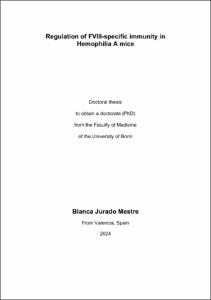Regulation of FVIII-specific immunity in Hemophilia A mice
Regulation of FVIII-specific immunity in Hemophilia A mice
| dc.contributor.advisor | Kurts, Christian | |
| dc.contributor.author | Jurado Mestre, Blanca | |
| dc.date.accessioned | 2024-09-23T14:04:18Z | |
| dc.date.issued | 23.09.2024 | |
| dc.identifier.uri | https://hdl.handle.net/20.500.11811/12244 | |
| dc.description.abstract | The major complication of Hemophilia A treatment is the formation of inhibitors that neutralize the administered FVIII. Immune tolerance induction (ITI) is the most frequently used therapy in order to establish long-lasting tolerance towards FVIII in patients with inhibitors. However, predicting ITI success is challenging and the underlying cellular and molecular mechanisms are poorly described, thus therapy stability and duration is individualized, and might be influenced by several risk factors. Here, I demonstrate that upon successful tolerization of HemA mice, a PR8 infection in the lung triggered a systemic alteration of the inflammatory state. FVIII-specific B cells, responsible for the anti-FVIII humoral alloimmune response, are increased upon infection, while the FVIII-specific Tregs and their PD-L1 expression, induced during ITI in vivo, were reduced. Additionally, the FVIII-specific T cell compartment changed into a pro-inflammatory phenotype with an increase of FVIII-specific Th17 and Tfh cells. The inter-organ crosstalk between lung and spleen, was mediated by IFN-g, reactivating FVIII-specific B cells, which exhibited a significantly elevated IFN-gR expression. Consequently, these FVIII-specific B cells shifted their phenotype, by increasing their CD80 expression and an initiated IL-6 production. This shift contributed to a loss of the previously established tolerogenic environment towards FVIII achieved through the ITI protocol by fostering T cell dedifferentiation upon IL-6 exposure. Finally emphasizing the importance of the IL-6 signaling in tolerance disruption, the inhibition of IL-6R proved that the tolerized phenotype was restored upon application. Furthermore, other external elements such a high salt diet (HSD) did not impact the ITI outcome. Nevertheless, the HSD in wildtype mice induced elevated corticosterone levels in the bloodstream which modified the uptake behavior of splenic red pulp macrophages and seemed to promote a shift towards a pro-inflammatory phenotype. This was accompanied by a reduction of the FVIII levels in the bloodstream, disturbing the equilibrium of the FVIII homeostasis. Overall, these results may pave the wave for novel therapeutic intervention strategies to improve ITI success and the hemostatic FVIII abundance through a more detailed understanding of the interplay between FVIII, immune and tolerance responses and external factors. | en |
| dc.language.iso | eng | |
| dc.rights | In Copyright | |
| dc.rights.uri | http://rightsstatements.org/vocab/InC/1.0/ | |
| dc.subject | Immunologie | |
| dc.subject | Hämophilie A | |
| dc.subject | Toleranz | |
| dc.subject | Biologie | |
| dc.subject | Treg Zellen | |
| dc.subject | Immunology | |
| dc.subject | Hemophilia A | |
| dc.subject | Tolerance | |
| dc.subject | Biology | |
| dc.subject | Treg cells | |
| dc.subject.ddc | 570 Biowissenschaften, Biologie | |
| dc.title | Regulation of FVIII-specific immunity in Hemophilia A mice | |
| dc.type | Dissertation oder Habilitation | |
| dc.identifier.doi | https://doi.org/10.48565/bonndoc-389 | |
| dc.publisher.name | Universitäts- und Landesbibliothek Bonn | |
| dc.publisher.location | Bonn | |
| dc.rights.accessRights | embargoedAccess | |
| dc.date.embargoEndDate | 01.10.2026 | |
| dc.identifier.urn | https://nbn-resolving.org/urn:nbn:de:hbz:5-77595 | |
| ulbbn.pubtype | Erstveröffentlichung | |
| ulbbnediss.affiliation.name | Rheinische Friedrich-Wilhelms-Universität Bonn | |
| ulbbnediss.affiliation.location | Bonn | |
| ulbbnediss.thesis.level | Dissertation | |
| ulbbnediss.dissID | 7759 | |
| ulbbnediss.date.accepted | 15.07.2024 | |
| ulbbnediss.institute | Medizinische Fakultät / Institute : Institut für Experimentelle Immunologie (IEI) | |
| ulbbnediss.fakultaet | Medizinische Fakultät | |
| dc.contributor.coReferee | Hernández, Carlos | |
| ulbbnediss.contributor.orcid | https://orcid.org/0000-0002-9741-0350 |
Files in this item

This document has got an embargo.
This item appears in the following Collection(s)
-
E-Dissertationen (2097)



